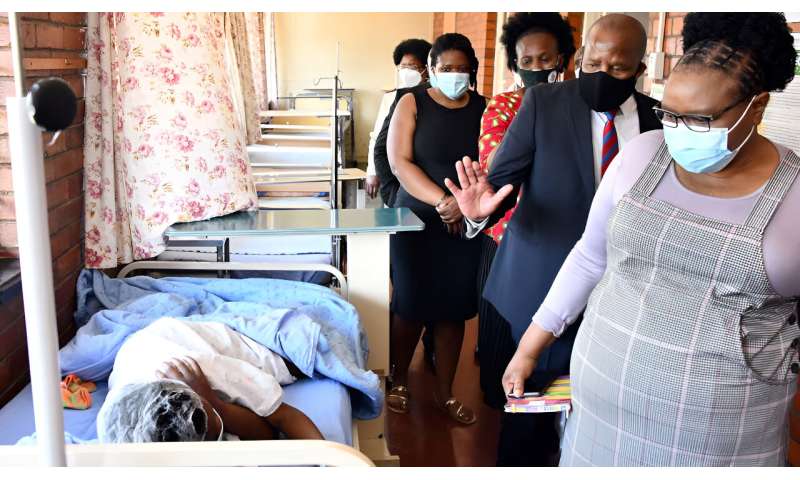Science advisory project eyes better pandemic response

A new scientific advisory network spanning 12 African countries will explore how the region responded to the COVID-19 pandemic and empower scientists to play a pivotal role in shaping national response plans for future pandemics.
Principal investigator Pacifique Ndishimye, of the University of Rwanda, says most African countries have less than 1,000 effective beds and only a few ventilators available for millions of people.
Access to vital services during the pandemic was hampered by overcrowding and understaffing in urban areas and poor roads and transport in rural areas, he notes.
His project aims to showcase the role of science advice and diplomacy in fostering collaborations between African scientists and policymakers during a health crisis and beyond.
"Today, it seems that Africa is a real case study in its diverse countries' response strategies as well as in its resilience to the pandemic," Ndishimye tells SciDev.Net.
"Health researchers, decision-makers, scientists of all disciplines and implementers need to work together better to ensure that research evidence can be taken up into policy and practice at all levels and shared worldwide."
Established because of the recognized gap in formal liaison mechanisms between Africa's diverse research structures and advisory institutions, Ndishimye believes the advisory network is a step toward bridging this divide.
It will focus on 12 African countries: Benin, Burkina-Faso, Cameroun, Central African Republic, Democratic Republic of Congo, Gambia, Guinea Bissau, Ivory Coast, Mali, Niger, Rwanda and Senegal.
The project—named Rapid Optimal COVID-19 Responses Through Science Advice of a Multidisciplinary Multilateral Demonstration Network—was announced at a meeting of COVID-19 Africa Rapid Grant Fund (CARGF) recipients in Pretoria, South Africa, last month (23-27 October).
CARGF was funded by the Science Granting Councils Initiative (SGCI), South Africa's National Research Foundation (NRF), Canada's International Development Research Centre (IDRC), the Swedish International Development Cooperation Agency, UK Research and Innovation, and South Africa's Department of Science and Innovation and other partners.
Beyond immediate pandemic response, the project recommended strategies to enhance public participation in science, improve advisory bodies' performance and independence, and fortify governance structures, Ndishimye said.
He hopes the initiative will not only impact immediate pandemic responses, but also support ongoing partnerships between scientific communities, governments and the private sector.
Collaborating with the Rwanda Ministry of Health, the project introduced a screening method, which it called the "pooling strategy."
This strategy combined samples from multiple individuals in a single tube for testing and to monitor infection rates.
"This pooling strategy is an approach to reduce the cost and usage of COVID-19 test kits," Ndishimye said.
"Along with other measures, Rwanda has been ranked first in Africa in managing the pandemic and making information accessible to the public."
Dorothy Ngila, director of strategic partnerships at NRF, said that the CARGF was created to contribute to the continent's response to the pandemic.
She explained that it was also intended to leverage existing, multilateral collaborations in support of Africa's consolidated response to the pandemic, while forging new collaborations with international partners.
"It was an experiment on how African Science Granting Councils and funding partners could use an existing multilateral platform on research and science to respond to an emergency," she added.
David O'Brien, senior program manager at IDRC, said his organization was interested in supporting research, science communication and science policy in Africa by Africans, as well as building evidence to inform public health policies around the management of COVID-19.
"At that time, while national governments were responding, we saw an opportunity to support a multilateral research and science engagement program with the support of funding agencies involved in the Science Granting Councils Initiative," he said.
The project recommends enhanced public participation in science and research backed by science communication programs, alongside promotion of science education and literacy.
The researchers also called for measures to improve the performance and independence of advisory bodies, including ensuring transparency in selecting board members to help reduce "political meddling."
Petro Terblanche, chief executive officer of South African vaccine maker Afrigen Biologics, said only about a quarter of collaborations taking place in Africa were between African scientists. She said most collaborations involved scientists from the global South.
"One way of improving the science landscape in Africa is by local scientists collaborating more among themselves and working with each other on joint projects," Terblanche said.
Putting in place strong governance structures, hiring people with a range of expertise, giving boards financial autonomy, and providing professional development for staff would enhance the success of advisory bodies, Ndishmye told SciDev.Net
Provided by SciDev.Net